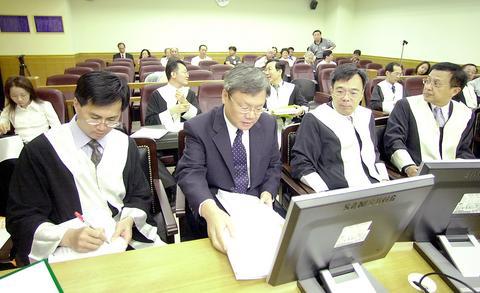Although they did not submit any new evidence yesterday, the pan-blue alliance's attorneys said that the Central Election Commission (CEC) had failed to carry out its duties to maintain a fair and clean election, and demanded that the presidential election be rendered invalid.
The argument by the Chinese Nationalist Party (KMT) and People First Party (PFP) alliance's attorneys was not strong enough to persuade the judges, and Taiwan High Court presiding judge Cheng Ya-ping (

PHOTO: LO PEI-TEH, TAIPEI TIMES
Lee Tsung-teh (
The lawyer was apparently referring to the March 19 attempt to assassinate President Chen Shui-bian (
"The evidence we collected showed that many voters decided not to vote or voted for Chen and Lu after the shooting," said Lee. "Under these kinds of circumstances, the CEC should have suspended the election until investigators closed the case."
The evidence mentioned by Lee includes a questionnaire conducted by the National Policy Foundation (
Lee's argument was immediately rebutted by Democratic Progressive Party (DPP) defense counsel Johnson Chuang (
"KMT Chairman Lien Chan (連戰) said we shall carry on with the election when he was interviewed on TV after the shooting took place," said Chuang. "Your Honor, what I said is verifiable if you ask for the video footage from any of local TV stations. Why is it that they are complaining the election should have been suspended now? It is ironic, isn't it?"
Huang Chao-yuan (黃昭元), a National Taiwan University law professor and a CEC member said that the alliance's complaint is illogical.
"The CEC is only authorized to suspend an election when the candidate is dead. While they [the plaintiffs] are complaining that we did not `do something,' does that mean the CEC's authorization should be expanded?" said Huang. "The CEC is a government office which is supposed to stay neutral under all kinds circumstances, no?"
Article 17, Section 1 of the Referendum Law (
According to the article, the referendum shall be carried out if the president proposes it and the Cabinet approves, if the issue concerns national defense.
Other than issues of national defense, a referendum can be carried out with an endorsement of 5 percent of registered voters and an approval by the Legislature's referendum evaluation committee.
"This is extremely unfair to the alliance's candidates," said Lee.
Before Lee finished his argument over the article, Cheng immediately rebutted by asking, "Excuse me, but, isn't the current Referendum Law the version which was passed by KMT and PFP lawmakers? If so, why are you complaining about something that was passed by your own lawmakers?" the judge asked.
Yesterday's four-hour debate did not result in any conclusion, and Cheng did not announce the next hearing date.

TRAGEDY STRIKES TAIPEI: The suspect died after falling off a building after he threw smoke grenades into Taipei Main Station and went on a killing spree in Zhongshan A 27-year-old suspect allegedly threw smoke grenades in Taipei Main Station and then proceeded to Zhongshan MRT Station in a random killing spree that resulted in the death of the suspect and two other civilians, and seven injured, including one in critical condition, as of press time last night. The suspect, identified as a man surnamed Chang Wen (張文), allegedly began the attack at Taipei Main Station, the Taipei Fire Department said, adding that it received a report at 5:24pm that smoke grenades had been thrown in the station. One man in his 50s was rushed to hospital after a cardiac arrest

SAFETY FIRST: Double the number of police were deployed at the Taipei Marathon, while other cities released plans to bolster public event safety Authorities across Taiwan have stepped up security measures ahead of Christmas and New Year events, following a knife and smoke bomb attack in Taipei on Friday that left four people dead and 11 injured. In a bid to prevent potential copycat incidents, police deployments have been expanded for large gatherings, transport hubs, and other crowded public spaces, according to official statements from police and city authorities. Taipei Mayor Chiang Wan-an (蔣萬安) said the city has “comprehensively raised security readiness” in crowded areas, increased police deployments with armed officers, and intensified patrols during weekends and nighttime hours. For large-scale events, security checkpoints and explosives

PUBLIC SAFETY: The premier said that security would be tightened in transport hubs, while President Lai commended the public for their bravery The government is to deploy more police, including rapid response units, in crowded public areas to ensure a swift response to any threats, President William Lai (賴清德) said yesterday after a knife attack killed three people and injured 11 in Taipei the previous day. Lai made the remarks following a briefing by the National Police Agency on the progress of the investigation, saying that the attack underscored the importance of cooperation in public security between the central and local governments. The attack unfolded in the early evening on Friday around Taipei Main Station’s M7 exit and later near the Taipei MRT’s Zhongshan

ON ALERT: Taiwan’s partners would issue warnings if China attempted to use Interpol to target Taiwanese, and the global body has mechanisms to prevent it, an official said China has stationed two to four people specializing in Taiwan affairs at its embassies in several democratic countries to monitor and harass Taiwanese, actions that the host nations would not tolerate, National Security Bureau (NSB) Director-General Tsai Ming-yen (蔡明彥) said yesterday. Tsai made the comments at a meeting of the legislature’s Foreign Affairs and National Defense Committee, which asked him and Minister of National Defense Wellington Koo (顧立雄) to report on potential conflicts in the Taiwan Strait and military preparedness. Democratic Progressive Party (DPP) Legislator Michelle Lin (林楚茵) expressed concern that Beijing has posted personnel from China’s Taiwan Affairs Office to its